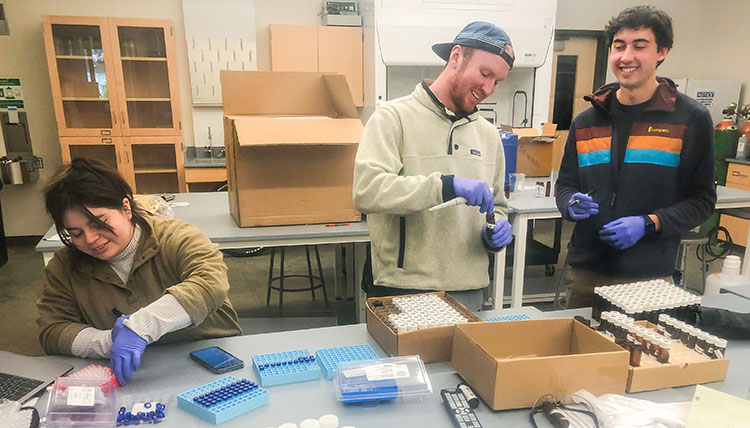2025 Project: Safeguarding Drinking Water from Wildfire Impacts
10 weeks: dates flexible
Wildfires are posing a growing threat to drinking water by introducing harmful materials from partially combusted vegetation, like pyrogenic organic matter (PyOM), into water supplies. These substances make it harder for water treatment plants to clean water and increase the risk of harmful disinfection byproducts. This project explores innovative solutions, such as powdered activated carbon adsorption combined with coagulation, to help remove wildfire-related pollutants. The goal is to provide water treatment plants with the tools they needed to keep our water safe in the face of increasingly frequent and more severe wildfires. The length of the research program is 10 weeks. The start and end dates are flexible and can be decided together by research mentor (Dr. Shimabuku) and applicant.
Gonzaga civil engineering undergraduates have worked with Dr. Shimabuku on developing biochar, a low-cost and sustainable alternative to activated carbon, to use in drinking water filters to remove per/poly-fluorinated alkyl substances (PFAS) often referred to as “Forever Chemicals”.
A goal of the project was to determine how biochar production conditions, like peak temperature and heating duration, would influence the performance of biochar.
A comparison of how biochar is produced by a manufacturer based out of Spokane County versus at the Gonzaga lab is shown. Students that visited this facility learned what the range of production conditions this biochar manufacturer can achieve, which was used to inform the production conditions they tested in the lab.
Working with Dr. Shimabuku, Gonzaga undergraduates are also studying the effects of wildfires on drinking water as part of a 5-year USDA Forest Service Grant. Students are working to treat drinking water sources impacted by a wildfire with activated carbon that could remove organic contaminants. The test is being performed with a jar test apparatus that can precisely simulate mixing conditions achieved in full-scale drinking water treatment plants.
Undergraduates in the Environmental Engineering lab have had the opportunity to solve real-world environmental engineering problems. In addition to awards mentioned, four Gonzaga undergraduates have been co-authors on a peer-reviewed publication with Dr. Shimabuku.







